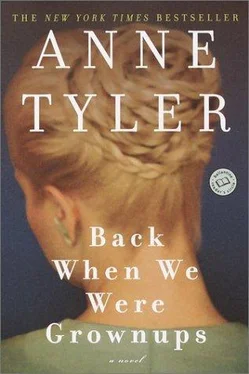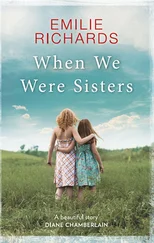This was not the master bedroom. (That had somehow gone to Poppy, after her mother-in-law died.) It was her husband’s boyhood room, and traces of his boyhood enthusiasms could still be found here and there — in the half-dozen odd-colored rocks arranged on top of the bookcase, the framed display of wheat-sheaf pennies hanging on one wall, the Baltimore Colts decal plastered irremovably inside the closet door. Joe Davitch had been full of enthusiasms, even as a grown man. He’d been large in spirit and in frame, exuberant and outgoing, booming-voiced, quick to laugh, given to flinging out both hands in a gesture of wholehearted welcome.
Really it was Joe who had had the open arms.
She turned from the window and collected her clothes: an Indian blouse embroidered with peacocks, a flounced calico skirt, and the white cotton, old-lady underwear she had come to favor now that there was no one else to see it. She clutched all this to her chest and crossed the hall to the bathroom, which gave off the comforting smell of aged enamel paint and Ivory soap. The radiator was as filigreed and scrolled as a silver tea urn. The claw-footed bathtub was big enough to sleep in.
Then halfway through her shower: bam-bam! Poppy, knocking on the bathroom door. She squinched her face against the spray and started humming, because she wanted to go on musing about the boy in her dream. His stubby blond eyelashes. ( Her lashes, which didn’t even show unless she remembered, as she rarely did, to brush them with mascara.) His long-fingered, angular hands. (The hands were not hers, but whose, then? Whom did they remind her of?)
At some point Poppy gave up and went away, but she couldn’t have said just when.
* * *
“I had the oddest dream,” she told Poppy over breakfast.
“Were there any numbers in it?”
She was startled, not so much by the question as by the fact that he had heard her. Nowadays, he seemed to be absent so often. She looked at him over her coffee cup and realized, much later than she should have, that he was dressed wrong. He was wearing a pair of brown suit pants and a sleeveless undershirt but no shirt, so that his suspenders cut directly across his whiskery bare shoulders. After breakfast she would have to talk him into something more appropriate.
“If you can recall any numbers,” he told her, “my friend Alex — remember Alex Ames from my teaching days? — he is always after me for numbers to play the lottery with. He wants the numbers from my dreams, but I don’t have any dreams anymore.”
“Sorry, no,” she told him. “This was about a boy. He seemed to be my son.”
“Which one?”
“Pardon?”
“Which of your sons was it?”
“Poppy,” she said. “I don’t have any sons.”
“Then what’d you go and dream about them for?”
She sighed and took another sip of coffee.
This was a man unrelated to her — an uncle only by marriage. The brother of her late father-in-law. Yet here they were, living out their lives together like some cranky old married couple. Her mother-in-law and Joe had invited Poppy to stay for a while after his wife died, when it seemed he was about to turn into a telephone drunk. (Calling up at all hours: “Can I honestly be expected to go on without my Joycie?”) Then her mother-in-law died; then Joe himself died — killed in a car wreck just six years after their wedding — and somehow, Poppy had never left. Rebecca had spent more years now with Poppy than with anyone she’d ever known; and she didn’t even especially like the man, which was not to say she actively disliked him. She just thought of him as a kind of fellow boarder. It was a matter of pure happenstance that she was the one who had to listen to the state of his bowels every morning, and accompany him on his exercise walk, and ferry him to the doctor and the dentist and the physical therapist.
But he was someone to talk to, at least; so she tried again. “In my dream I was on a train,” she told him, “and this boy was sitting next to me. He was, I don’t know, in his early teens — that awkward, beanpole stage just after they get their growth spurt — and it seemed to be understood that he was my son.”
“Do you recall what number train it was?”
“No, and I don’t know where we were going, either. Just that he and I were traveling.”
And that she loved him, she wanted to say. But that would sound so theatrical, in this normal, workaday kitchen with the linoleum worn black and the chimney bricks all pocked, the checked plastic tablecloth sandy with toast crumbs, the glass-paned cupboard doors reflecting squares of yellow sunshine.
“Well,” Poppy said, “I would call that a dream that was lacking in plot. In fact it’s sort of uninteresting; so I’d like to switch the subject to my birthday.”
“Your birthday!” She felt disoriented. “The birthday you just had?”
“The birthday coming up.”
“But that’s not till December!”
“Yes, December eleventh. I’m going to be one hundred.”
“Well, I know that, Poppy,” she said.
He didn’t look it. He had hit a kind of wall in the aging process; he seemed old but not astronomically old, just slightly more shrunken than when she’d first met him. His white mustache was still bushy, and his face (unshaven, till after breakfast) bore only a few deep crevices rather than the netting of wrinkles you would expect.
“I suppose,” he said, suddenly absorbed in pressing an index finger to the toast crumbs, “you’re planning some big wingding for me. I mean bigger than your usual.”
“Oh. Well. Yes, certainly I am!” she said. It was his averted gaze that let her know he wanted a wingding; that he wasn’t bringing it up just to discourage the notion. “December’s still pretty far away,” she told him, “but when we get a bit closer, oh, I’m going to need your advice about all kinds of things!”
“I do happen to have a guest list,” he said.
“Wonderful, Poppy.”
She thought he meant he had a guest list somewhere, but he started fumbling through his trousers and finally came up with a small, fat square of folded paper. As he passed it across the table to her, the telephone rang. She rose to answer, but not before she had tucked the list in her skirt pocket and patted the pocket several times in a reassuring way.
It was NoNo on the phone. “I called to say thanks for the picnic,” she said. “Barry says thanks, too. He’s going to write you a note.”
“Oh, honey, he doesn’t have to do that,” Rebecca said. She was watching Poppy, who had started eating marmalade straight from the jar. “I’m just glad you both enjoyed it.”
“He really liked our family,” NoNo said.
Her words hung in the air, waiting; so Rebecca said, “And we liked him ! All of us just loved him.”
Poppy raised his eyebrows at her. She turned away from him and cupped the receiver. “How’s his little boy?” she asked. “He didn’t catch cold, I hope.”
“He’s fine, I assume, but I haven’t called them yet today because Barry’s mornings are so frantic. If you could see how the two of them live! He has Peter wear tomorrow’s clothes to bed on school nights, just to save time.”
“Goodness,” Rebecca said. “Now, where is Peter’s mother, exactly?”
“Who knows! She went off with a bunch of Buddhists or something; lives in some kind of commune somewhere.”
This was not so very different from NoNo’s mother, who had abandoned her three children for a career as a New York nightclub singer. (Or would-be singer.) But Rebecca thought it wisest not to point that out. She said, “You’re going to be a real help, once the two of you are married.”
“Yes, I thought I would start closing my shop a little earlier, so that Peter won’t be alone so many hours after school.”
Читать дальше












